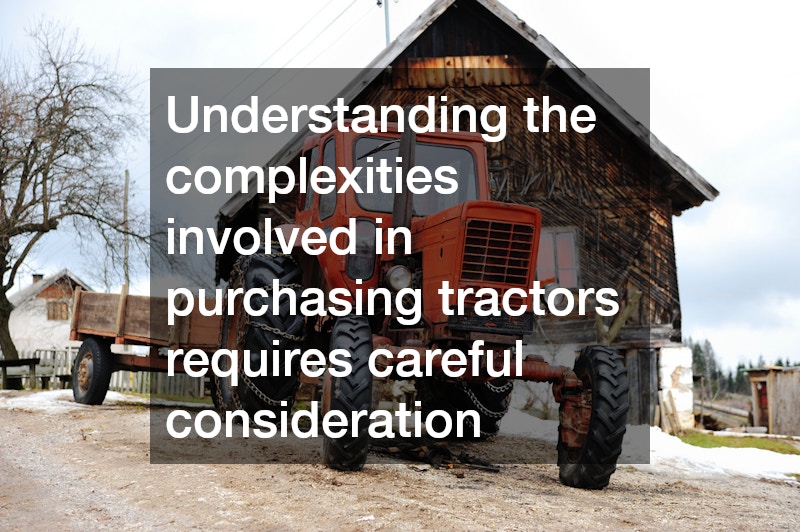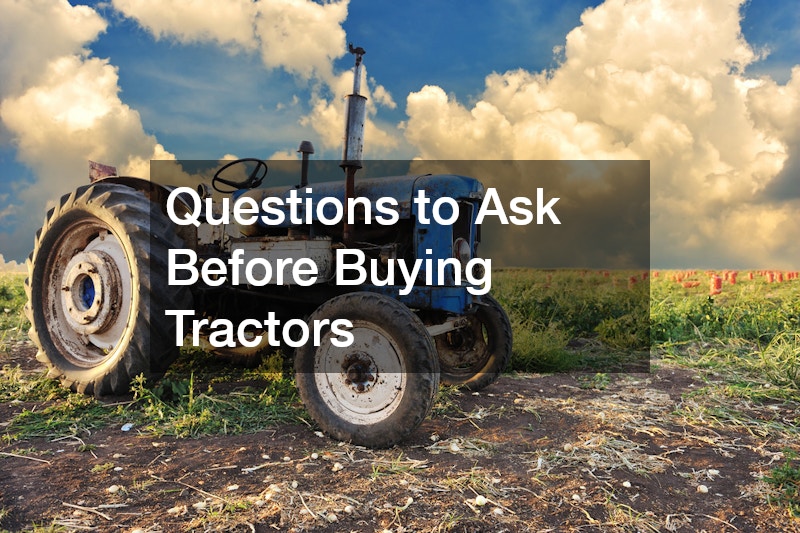
Understanding the complexities involved in purchasing tractors requires careful consideration and in-depth analysis. This guide aims to provide prospective buyers with essential questions to ask before making a purchase, helping to ensure the tractor meets their specific needs and circumstances. Making an informed decision can lead to increased efficiency, cost savings, and greater satisfaction in the long term.
What are the Key Features and Specifications to Consider?
Engine Power and Efficiency
Examining the horsepower and engine efficiency is crucial for determining the tractor’s capability and performance under various conditions. Higher engine power ensures that a tractor can handle strenuous tasks while maintaining performance across different terrains. Efficiency also plays a role in fuel consumption, which can significantly affect operating costs over time.
Considering work requirements, engine power should align with the intensity and frequency of tasks. A well-matched tractor ensures seamless operation without unnecessary exertion on the machinery. Efficiency not only impacts fuel costs but also influences overall longevity and maintenance needs.
For those looking to maximize productivity, it’s important to strike a balance between power and efficiency. Too much power can lead to excessive fuel use, while too little may hinder performance. Ensuring the tractor meets your specific demands can greatly enhance operational effectiveness.
Transmission Types
Understanding different transmission types, such as manual, hydrostatic, and CVT, can impact operational ease and the tractor’s adaptability to various tasks. Each type offers different benefits, such as hydrostatic for easy speed adjustments and manual for robust power delivery. Selecting the right transmission can enhance user comfort and improve task execution.
With manual transmissions, operators may benefit from increased control, particularly in rough terrains. Hydrostatic and CVT transmissions often offer smoother operation, ideal for more general and varied applications. Knowing the tasks you intend to perform can guide you in choosing the most effective transmission type.
The choice of transmission type can also affect the learning curve and maintenance requirements. More complex transmissions may increase initial purchase costs, but they can offer long-term savings in operational efficiency. Balancing these considerations is essential for choosing the right tractor for your circumstances.
Technology and Additional Features
Modern tractors often come with advanced technology and additional features that may increase productivity and convenience but also influence the cost. Features such as GPS systems, ergonomic controls, and automated steering can enhance the ease of use and task precision. However, integrating these technologies requires an upfront investment and ongoing training.
Advanced technology can significantly improve farm management through better resource allocation and time efficiency. Integrated systems can provide real-time data, assisting in decision-making and planning. Before making a purchase, evaluate whether the cost of these technologies aligns with the benefits they offer for your operations.
Balancing technology with usability is crucial, as overly complex systems might deter some operators. While features like automated steering can reduce fatigue, it’s essential to ensure that all operators are adequately trained. Integration of technology requires thoughtful consideration of both immediate and long-term impacts.
How to Determine the Right Size and Type of Tractor?
Evaluating the size and type of land, along with the tasks you need to perform, will help determine the appropriate size and type of tractor for your needs. Large plots with varied terrain might necessitate robust, versatile tractors. Smaller plots may benefit from compact models designed for maneuverability.
Analyzing your specific farming activities, such as plowing, tilling, and harvesting, can guide you toward a more precise tractor choice. The weight and size of machinery may impact soil compaction and overall land management. It’s crucial to match the tractor to your land characteristics to optimize productivity.
Understanding the scope and scale of your operations ensures the chosen tractor efficiently meets daily demands. Whether it’s light gardening or extensive farming, your demands dictate the machinery’s scale and capability. Ensuring compatibility with the tasks reduces wear and prolongs tractor life.
By addressing these pivotal questions, you can make a more informed decision when purchasing a tractor. Evaluating key features and determining the right size and type can significantly influence the productivity and satisfaction you achieve with your new machine. A thorough understanding of your needs and the available options empowers you to invest in machinery that will support your agricultural endeavors effectively.
.


